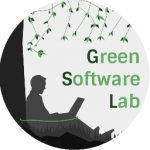Rui Alexandre Afonso Pereira concluded his PhD on October, 29th 2018, at Informatics Department (DI) of the University of Minho (DI-UMinho), with a thesis entitled “Energyware Engineering: Techniques and Tools for Green Software Development“. He was advised by Professors João Saraiva and Jácome Cunha (DI/UMinho) and his research was also hosted by the research center HASLab/INESCTEC.
Abstract – Energy consumption is nowadays one of the most important concerns worldwide. While hardware is generally seen as the main culprit for a computer’s energy usage, software too has a tremendous impact on the energy spent, as it can cancel the efficiency introdued by the hardware. Green Computing is not a new field of study, but the focus has been,
until recently, on hardware. While there has been advancements in Green Software techniques, there is still not enough support for software developers so they can make their code more energy-aware, with various studies arguing there is both a lack of knowledge and lack of tools for energy-aware development.
This thesis intends to tackle these two problems and aims at further pushing forward research on Green Software. This software energy consumption issue is faced as a software engineering question. By using systematic, disciplined, and quantifiable approaches to the development, operation, and maintenance of software we defined several techniques, methodologies, and tools within this document. These focus on providing software developers more knowledge and tools to help with energy-aware software development, or Energyware Engineering.
Insights are provided on the energy influence of several stages performed during a software’s development process. We look at the energy efficiency of various popular programming languages, understanding which are the most appropriate if a developer’s concern is energy consumption. A detailed study on the energy profiles of different Java data structures is also presented, along with a technique and tool, further providing more knowledge on what energy efficient alternatives a developer has to choose from. To help developers with the lack of tools, we defined and implemented a technique to detect energy inefficient fragments within the source code of a software system. This technique and tool has been shown to help developers improve the energy efficiency of their programs, and even outperforming a runtime profiler.Finally, answers are provided to common questions and misconceptions within this field of research, such as the relationship between time and energy, and how one can improve their software’s energy consumption. This thesis provides a great effort to help support both research and education on this topic, helps continue to grow green software out of its infancy, and contributes to solving the lack of knowledge and tools which exist for Energyware Engineering.

Post a comment